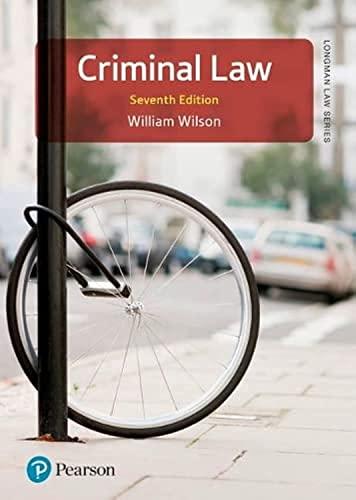Question
Enron is one of the most infamous examples of corporate fraud in U.S. history. The scandal that destroyed the company resulted in approximately $60 billion
Enron is one of the most infamous examples of corporate fraud in U.S. history. The scandal that
destroyed the company resulted in approximately $60 billion in lost shareholder value. Sherron Watkins,
an officer of the company, discovered the fraud and first went to her boss and mentor, founder and
chairperson Ken Lay, to report the suspected accounting and financial irregularities. She was ignored
more than once and eventually went to the press with her story. Because she did not go directly to the
SEC, Watkins received no whistleblower protection. (The Sarbanes-Oxley Act was not passed until after
the Enron scandal. In fact, it was Watkins's circumstance and Enron's misdeeds that helped convince
Congress to pass the law.40)
Now a respected national speaker on the topic of ethics and employees' responsibility, Watkins talks
about how an employee should handle such situations. "When you're faced with something that really
matters, if you're silent, you're starting on the wrong path . . . go against the crowd if need be," she said
in a speech to the National Character and Leadership Symposium, (a seminar to instill leadership and
moral qualities in young men and women). Sometimes employees, including managers, face an ethical dilemma that they seek to address from within rather than becoming a whistleblower. The risk is that they may be ignored or that their speaking up will be held against them. However, companies should want and expect employees to step forward and report wrongdoing to their superiors, and they should support that decision, not punish it. Sallie Krawcheck, a financial industry executive, was not a whistleblower in either the classical or the legal sense. She went to her boss with her discovery of wrongdoing at work, which means she had no legal protection under whistleblower statutes. Read her story in the following box. Watkins talks openly about the risk of being an honest employee, something employees should consider when evaluating what they owe their company, the public, and themselves. "I will never have a job in corporate America again. The minute you speak truth to power and you're not heard, your career is never the same again."
Enron's corporate leaders dealt with the looming crisis by a combination of blaming others and leaving
their employees to fend for themselves. According to Watkins, "Within two weeks of me finding this
fraud, [Enron president] Jeff Skilling quit. We did feel like we were on a battleship, and things were not
going well, and the captain had just taken a helicopter home. The fall of 2001 was just the bleakest time
in my life, because everything I thought was secure was no longer secure."
1. Did Watkins owe an ethical duty to Enron, to its shareholders, or to the investing public to go public with her suspicions? 1a)Why
2. How big a price is it fair to ask a whistle-blowing employee to pay?
Step by Step Solution
There are 3 Steps involved in it
Step: 1

Get Instant Access to Expert-Tailored Solutions
See step-by-step solutions with expert insights and AI powered tools for academic success
Step: 2

Step: 3

Ace Your Homework with AI
Get the answers you need in no time with our AI-driven, step-by-step assistance
Get Started


